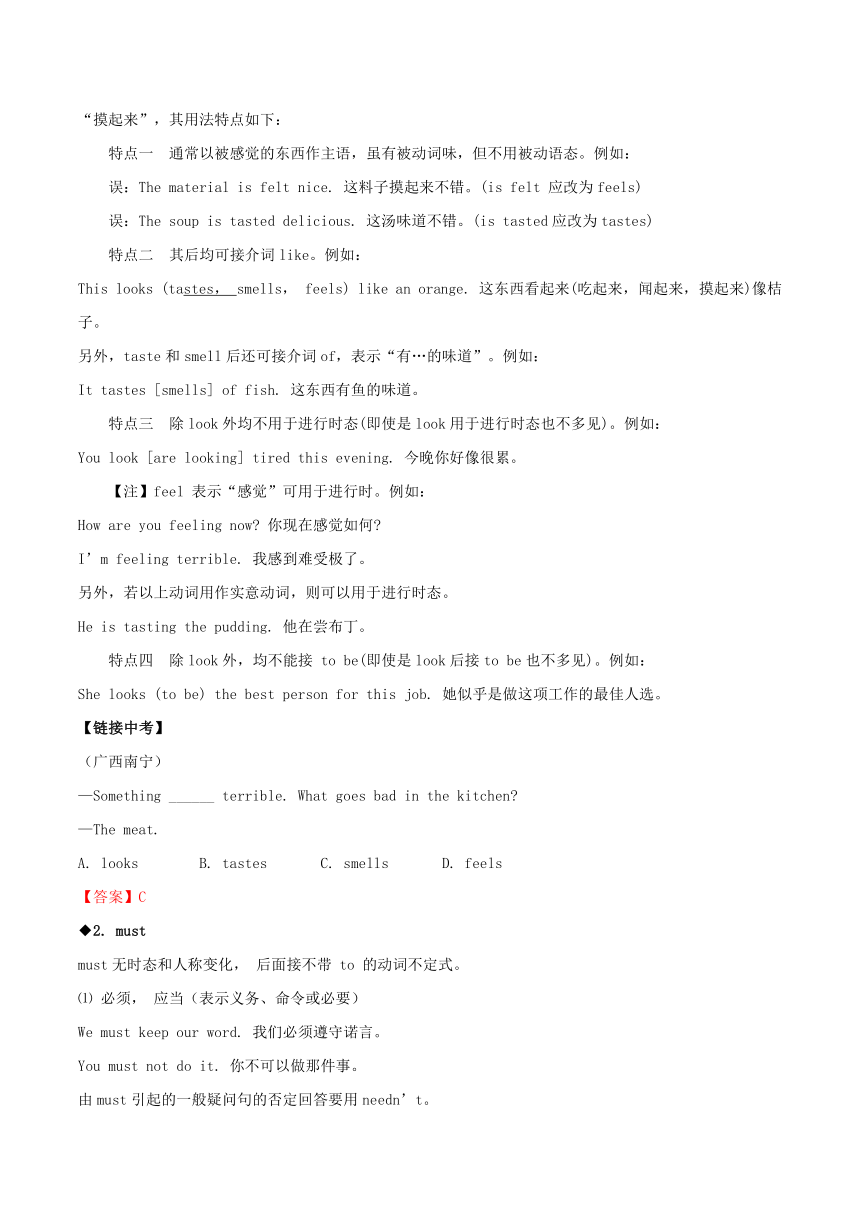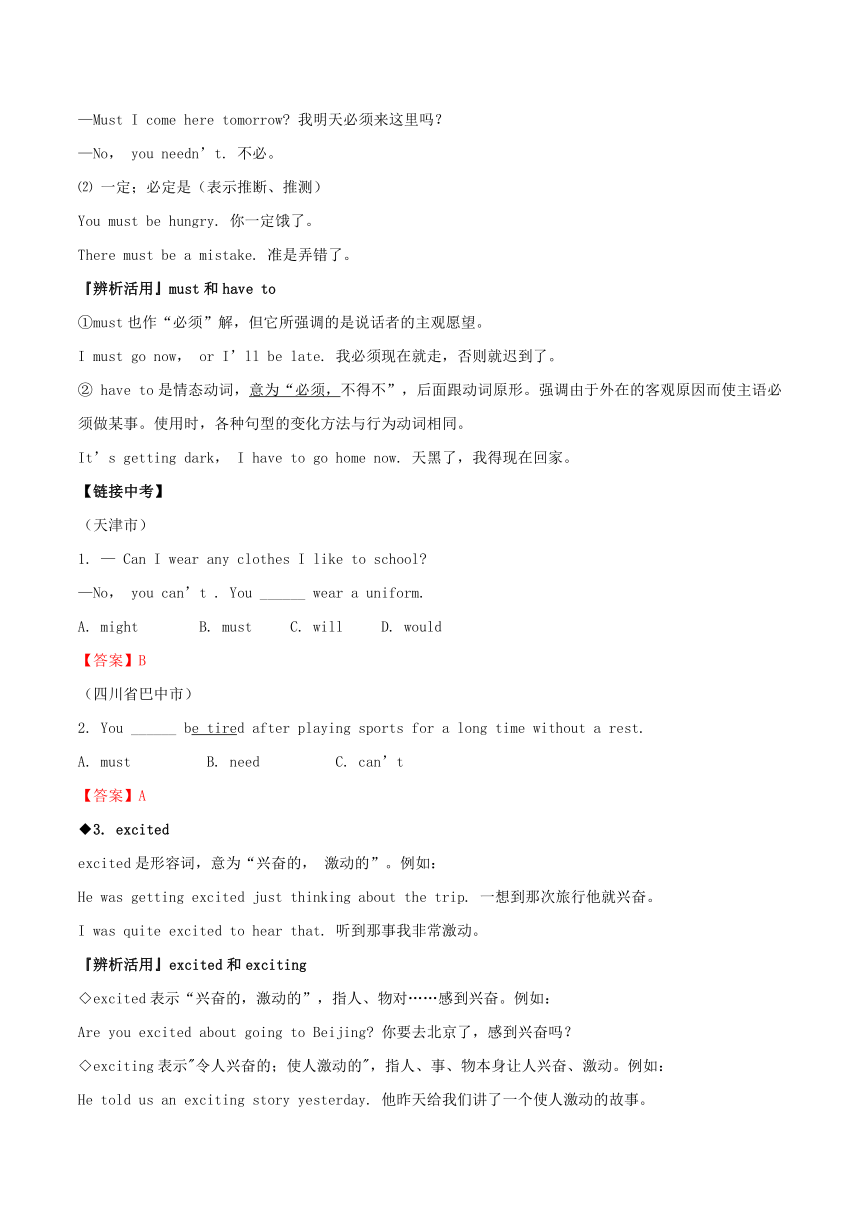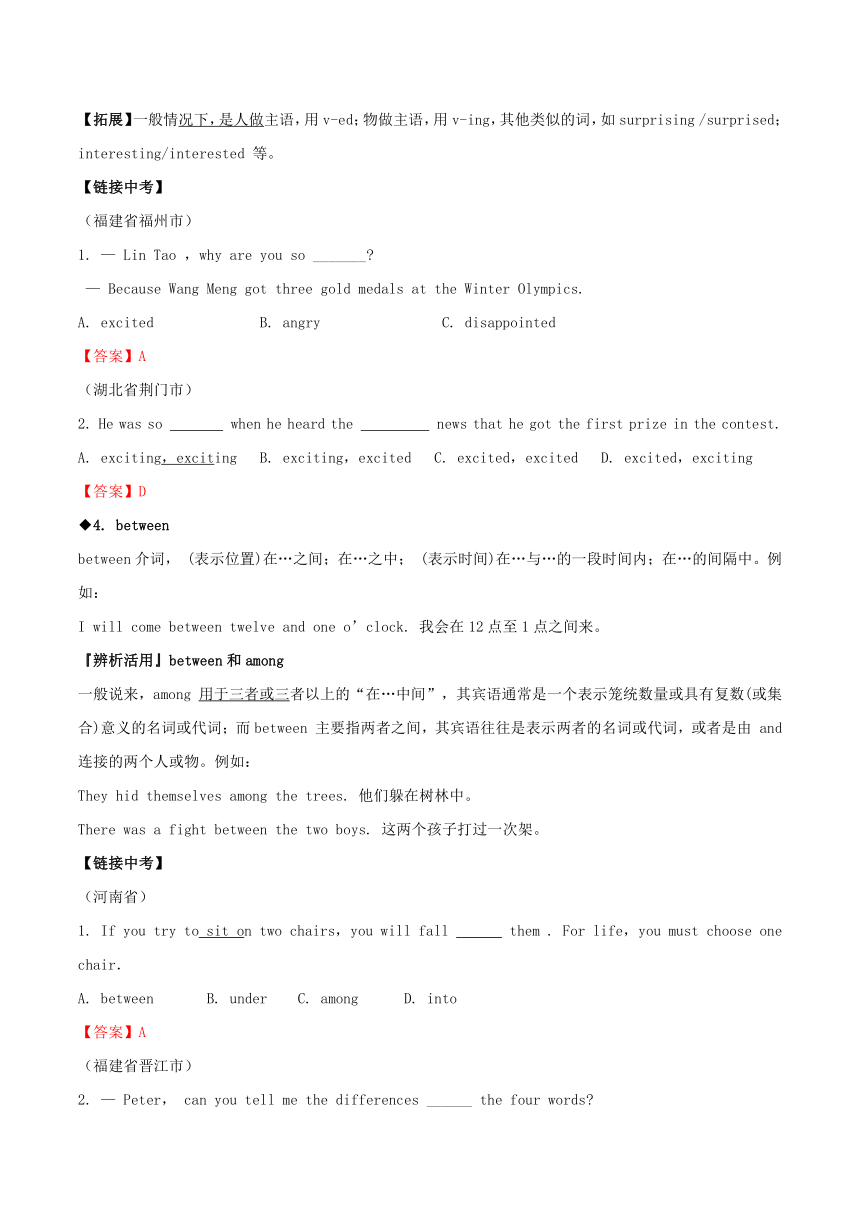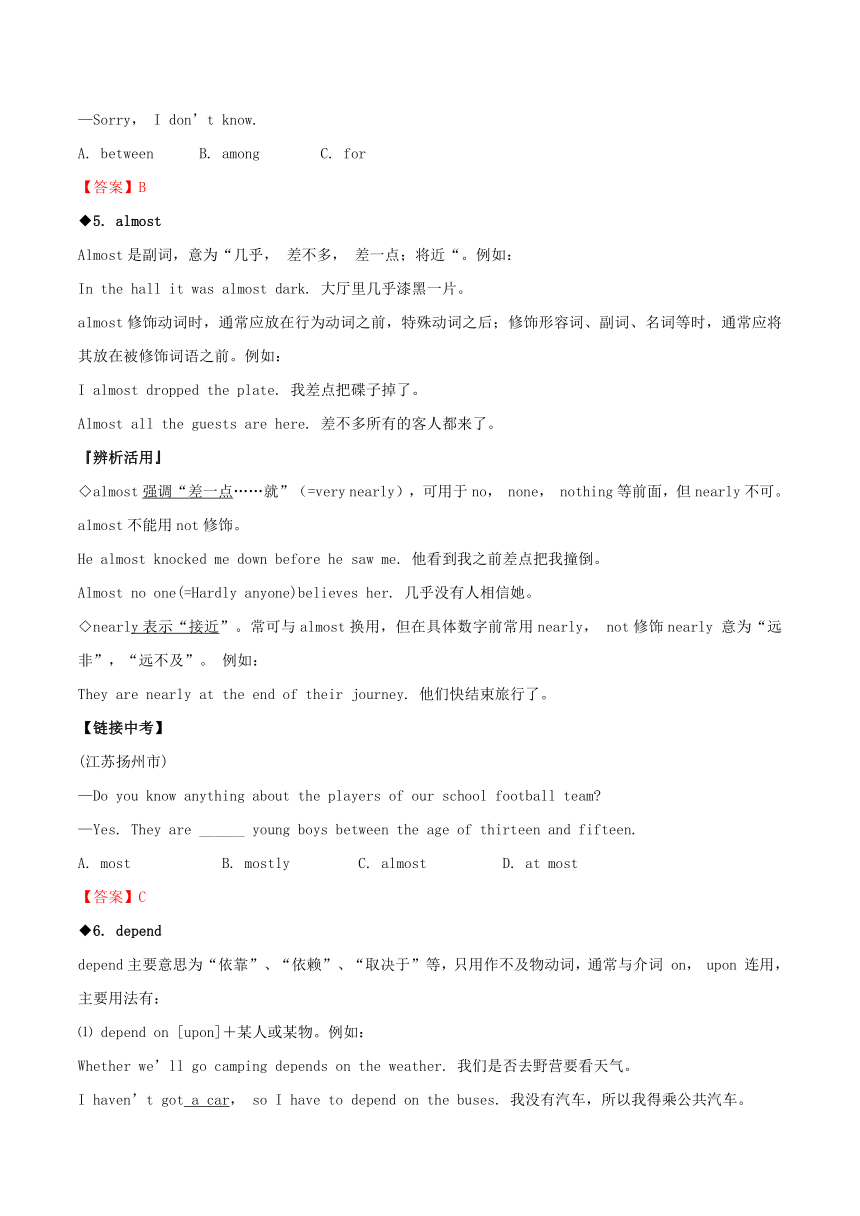中考英语总复习(上册)第二篇 课本要点梳理 第六讲 八上 Modules 7-12
文档属性
| 名称 | 中考英语总复习(上册)第二篇 课本要点梳理 第六讲 八上 Modules 7-12 |  | |
| 格式 | zip | ||
| 文件大小 | 37.8KB | ||
| 资源类型 | 教案 | ||
| 版本资源 | 外研版 | ||
| 科目 | 英语 | ||
| 更新时间 | 2016-08-26 06:56:18 | ||
图片预览





文档简介
Modules
7-12
必考词汇
◆1.
smell
◇表示“闻
(到)”、“感觉到”,是实义动词,注意以下用法:
⑴
其主语一般应是“人”或“动物”;
⑵
不用于进行式;
⑶
通常
(但不一定)与
can,
could
连用;
⑷
可接名
(代)词或“宾语+现在分词”
(但通常不接“宾语+动词原形”)。
例如:Can
you
smell
smoke
你闻到烟味了吗
Does
[Can]
a
bee
smell
蜜蜂有嗅觉吗
I
(can)
smell
something
burning.
我闻到了烧焦的气味。
若是强调正在“闻”、“嗅”的动作,有时也可以用于进行式:
He
was
smelling
the
flowers.
她在闻花香。
◇表示“闻起来”,是连系动词,注意以下用法:
⑴
主语一般应是被闻的对象;
⑵
通常接形容词
(而不是副词)作表语;
⑶
虽有被动意味,但只能用主动形式
(因连系动词是不及物动词)
例如:这些花闻起来很香。
正:The
flowers
smell
good.
误:The
flowers
smell
well.
◇有时单独使用,通常指发出不好闻的气味,有时也指有香味
(视具体的语境而定)。
例如:This
egg
smells.
这只蛋发臭了。
Do
the
flowers
smell
那花有香味吗
◇与介词of连用,表示“有…的气味”。
例如:Babies
smell
of
milk.
婴儿都有股乳香味。
【拓展】look,
sound,
smell,
taste,
feel的用法特点
当这几个词用作连系动词的时候,它们的意思分别是“看起来”、“听起来”、“闻起来”、“尝起来”、“摸起来”,其用法特点如下:
特点一
通常以被感觉的东西作主语,虽有被动词味,但不用被动语态。例如:
误:The
material
is
felt
nice.
这料子摸起来不错。(is
felt
应改为feels)
误:The
soup
is
tasted
delicious.
这汤味道不错。(is
tasted应改为tastes)
特点二
其后均可接介词like。例如:
This
looks
(tastes,
( http: / / www.21cnjy.com )smells,
feels)
like
an
orange.
这东西看起来(吃起来,闻起来,摸起来)像桔子。
另外,taste和smell后还可接介词of,表示“有…的味道”。例如:
It
tastes
[smells]
of
fish.
这东西有鱼的味道。
特点三
除look外均不用于进行时态(即使是look用于进行时态也不多见)。例如:
You
look
[are
looking]
tired
this
evening.
今晚你好像很累。
【注】feel
表示“感觉”可用于进行时。例如:
How
are
you
feeling
now
你现在感觉如何
I’m
feeling
terrible.
我感到难受极了。
另外,若以上动词用作实意动词,则可以用于进行时态。
He
is
tasting
the
pudding.
他在尝布丁。
特点四
除look外,均不能接
to
be(即使是look后接to
be也不多见)。例如:
She
looks
(to
be)
the
best
person
for
this
job.
她似乎是做这项工作的最佳人选。
【链接中考】
(广西南宁)
—Something
______
terrible.
What
goes
bad
in
the
kitchen
—The
meat.
A.
looks
B.
tastes
C.
smells
D.
feels
【答案】C
◆2.
must
must无时态和人称变化,
后面接不带
to
的动词不定式。
⑴
必须,
应当(表示义务、命令或必要)
We
must
keep
our
word.
我们必须遵守诺言。
You
must
not
do
it.
你不可以做那件事。
由must引起的一般疑问句的否定回答要用needn’t。
—Must
I
come
here
tomorrow
我明天必须来这里吗?
—No,
you
needn’t.
不必。
⑵
一定;必定是(表示推断、推测)
You
must
be
hungry.
你一定饿了。
There
must
be
a
mistake.
准是弄错了。
『辨析活用』must和have
to
①must也作“必须”解,但它所强调的是说话者的主观愿望。
I
must
go
now,
or
I’ll
be
late.
我必须现在就走,否则就迟到了。
②
have
to是情态动词,意为“必须,
( http: / / www.21cnjy.com )不得不”,后面跟动词原形。强调由于外在的客观原因而使主语必须做某事。使用时,各种句型的变化方法与行为动词相同。
It’s
getting
dark,
I
have
to
go
home
now.
天黑了,我得现在回家。
【链接中考】
(天津市)
1.
—
Can
I
wear
any
clothes
I
like
to
school
—No,
you
can’t
.
You
______
wear
a
uniform.
A.
might
B.
must
C.
will
D.
would
【答案】B
(四川省巴中市)
2.
You
______
be
tire
( http: / / www.21cnjy.com )d
after
playing
sports
for
a
long
time
without
a
rest.
A.
must
B.
need
C.
can’t
【答案】A
◆3.
excited
excited是形容词,意为“兴奋的,
激动的”。例如:
He
was
getting
excited
just
thinking
about
the
trip.
一想到那次旅行他就兴奋。
I
was
quite
excited
to
hear
that.
听到那事我非常激动。
『辨析活用』excited和exciting
◇excited表示“兴奋的,激动的”,指人、物对……感到兴奋。例如:
Are
you
excited
about
going
to
Beijing
你要去北京了,感到兴奋吗?
◇exciting表示"令人兴奋的;使人激动的",指人、事、物本身让人兴奋、激动。例如:
He
told
us
an
exciting
story
yesterday.
他昨天给我们讲了一个使人激动的故事。
【拓展】一般情况下,是人做
( http: / / www.21cnjy.com )主语,用v-ed;物做主语,用v-ing,其他类似的词,如surprising
/surprised;interesting/interested
等。
【链接中考】
(福建省福州市)
1.
—
Lin
Tao
,why
are
you
so
_______
—
Because
Wang
Meng
got
three
gold
medals
at
the
Winter
Olympics.
A.
excited
B.
angry
C.
disappointed
【答案】A
(湖北省荆门市)
2.
He
was
so
when
he
heard
the
news
that
he
got
the
first
prize
in
the
contest.
A.
exciting,excit
( http: / / www.21cnjy.com )ing
B.
exciting,excited
C.
excited,excited
D.
excited,exciting
【答案】D
◆4.
between
between介词,
(表示位置)在…之间;在…之中;
(表示时间)在…与…的一段时间内;在…的间隔中。例如:
I
will
come
between
twelve
and
one
o’clock.
我会在12点至1点之间来。
『辨析活用』between和among
一般说来,among
用于三者或三
( http: / / www.21cnjy.com )者以上的“在…中间”,其宾语通常是一个表示笼统数量或具有复数(或集合)意义的名词或代词;而between
主要指两者之间,其宾语往往是表示两者的名词或代词,或者是由
and
连接的两个人或物。例如:
They
hid
themselves
among
the
trees.
他们躲在树林中。
There
was
a
fight
between
the
two
boys.
这两个孩子打过一次架。
【链接中考】
(河南省)
1.
If
you
try
to
sit
o
( http: / / www.21cnjy.com )n
two
chairs,you
will
fall
them
.
For
life,you
must
choose
one
chair.
A.
between
B.
under
C.
among
D.
into
【答案】A
(福建省晋江市)
2.
—
Peter,
can
you
tell
me
the
differences
______
the
four
words
—Sorry,
I
don’t
know.
A.
between
B.
among
C.
for
【答案】B
◆5.
almost
Almost是副词,意为“几乎,
差不多,
差一点;将近“。例如:
In
the
hall
it
was
almost
dark.
大厅里几乎漆黑一片。
almost修饰动词时,通常应放在行为动词之前,特殊动词之后;修饰形容词、副词、名词等时,通常应将其放在被修饰词语之前。例如:
I
almost
dropped
the
plate.
我差点把碟子掉了。
Almost
all
the
guests
are
here.
差不多所有的客人都来了。
『辨析活用』
◇almost强调“差一点
( http: / / www.21cnjy.com )……就”(=very
nearly),可用于no,
none,
nothing等前面,但nearly不可。almost不能用not修饰。
He
almost
knocked
me
down
before
he
saw
me.
他看到我之前差点把我撞倒。
Almost
no
one(=Hardly
anyone)believes
her.
几乎没有人相信她。
◇nearly表示“接近
( http: / / www.21cnjy.com )”。常可与almost换用,但在具体数字前常用nearly,
not修饰nearly
意为“远非”,“远不及”。
例如:
They
are
nearly
at
the
end
of
their
journey.
他们快结束旅行了。
【链接中考】
(江苏扬州市)
—Do
you
know
anything
about
the
players
of
our
school
football
team
—Yes.
They
are
______
young
boys
between
the
age
of
thirteen
and
fifteen.
A.
most
B.
mostly
C.
almost
D.
at
most
【答案】C
◆6.
depend
depend主要意思为“依靠”、“依赖”、“取决于”等,只用作不及物动词,通常与介词
on,
upon
连用,主要用法有:
⑴
depend
on
[upon]+某人或某物。例如:
Whether
we’ll
go
camping
depends
on
the
weather.
我们是否去野营要看天气。
I
haven’t
got
a
car
( http: / / www.21cnjy.com ),
so
I
have
to
depend
on
the
buses.
我没有汽车,所以我得乘公共汽车。
有时可在某人或某物后用介词
for。例如:
Children
depend
on
their
parents
for
food
and
clothing.
儿童的衣食靠父母。
⑵
depend
on
[upon]+某人或某物+不定式或动名词。例如:
I’m
depending
on
you
to
do
the
work.
我指望你做这工作。
You
can’t
depend
on
the
train
arriving
on
time.
千万不要认为火车能正点到达。
⑶
depend
on
[upon]+从句。例如:
Our
success
depen
( http: / / www.21cnjy.com )ds
on
whether
everyone
works
hard
or
not.
我们的成功取决于每个人是否努力。
在
It
(all)
depends
on
[upon]+从句中,介词
on,
upon
有时可省略(主要见于口语中)。
例如:
It
depends
(on)
whether
you
can
afford
it.
这要看你是否买得起。
【链接中考】
(湖北省黄石市)
Whether
I’ll
go
to
Shanghai
______
the
result
of
the
examination.
A.
belongs
to
B.
cares
about
C.
depends
on
D.
Aims
at
【答案】C
◆7.
anything
⑴
anything表示“某事”、“某东
( http: / / www.21cnjy.com )西”,主要用于否定句,疑问句及条件句中,用以代替
something
(常译为:什么…);表示“任何事”、“任何东西”,主要用于肯定句
(有时也可用于其它句型)。例如:
Has
anything
interesting
happened
发生了什么有趣的事吗
We
can’t
believe
anything
he
says.
无论他说什么,我们都不能相信。
I
want
something
to
eat,
and
anything
will
do.
我想弄点东西吃,什么都行。
⑵
用作主语,谓语用单数;用代词时也用单数
(it)。例如:
Anything
is
better
than
nothing,
isn’t
it
有点总比什么都没有要好,不是吗
⑶
修饰anything的形容词应置于其后。例如:
Did
you
hear
anything
interesting
there
你在那儿听到什么有趣的事了吗
⑷
用于
be
anything
but,
意为“根本不是”、“一点不是”,可用于人和物。例如:
He’s
anything
but
a
hero.
他绝不是英雄。
【链接中考】
(四川省内江市)
1.
—
Oh,
you’re
reading
a
newspaper
.
Is
there
______
in
it
—I
don’t
know.
I
read
it
just
now.
A.
new
something
B.
anything
new
C.
something
new
【答案】B
(湖北省宜昌市)
2.
—
Hurry,
Mike!
The
bus
is
coming.
—Wait
a
moment,
please!
Let
me
see
if
there’s
______
left.
A.
anything
else
B.
something
important
C.
nothing
else
D.
any
other
things
【答案】A
经典句型
◆1.
What
does
your
dad
look
like
⑴
look
like的意思是“看上去像……”,这里的like是介词,常与感官动词连用,后接名词或代词的宾格形式。例如:
The
little
girl
looks
like
her
father.
小女孩看上去像她爸爸。
⑵
What
does
sb.
lo
( http: / / www.21cnjy.com )ok
like
用于提问人的长相、外貌,意为“他长得什么样?”;常见的回答有:He
has
long/
curly
hair.
He
has
a
medium
build/
height.
He’s
tall/short.
He
is
thin/
fat.
He’s
a
little
bit
heavy.
【拓展】
What’s
sb.
like
用于
( http: / / www.21cnjy.com )提问人的性格、品质等,意为“他是个什么样的人?”,句中like是介词;而What
does
sb.
like?用于提问人的爱好,意为“他喜欢什么?”,句中的like是动词。试比较:
①—
What
does
Cathy
look
like
卡西长得什么样
—She’s
tall,
and
she
has
black
hair.
她个子很高,一头黑发。
②—
What’s
Ruth
like
鲁思是个什么样的人呢
—She’s
quiet
and
a
little
shy.
她很文静,有点害羞。
③—
What
does
Paul
like 保罗喜欢什么
—He
likes
English
songs.
他喜欢英文歌曲。
【链接中考】
(·贵州省铜仁市)
—What
does
your
brother
look
like
—______.
A.
He
is
a
litt
( http: / / www.21cnjy.com )le
shy
B.
He
is
tall
C.
He
likes
dancing
D.
He
is
a
doctor
【答案】B
◆2.
Excuse
me.
Excuse
me的基本含义是“对不起
( http: / / www.21cnjy.com )”,“请原谅”。它可不像sorry那样,事后才向别人赔礼,而是事前就先向别人致歉。在日常生活中,以Excuse
me作为开头语,一来可以引起别注意;二来表示自己的彬彬有礼。
◇在英国英语中,下列情景要用Excuse
me:
⑴
向别人问路、问时间时。
Excuse
me!
Where
is
the
washroom
请问,洗手间在哪里?
⑵
当你询问别人是否准许你做事时。
Excuse
me!
Can
I
put
my
bike
here
对不起,我能把自行车放在这儿吗?
⑶
当你向别人打听某人(某事)时或当你要证实对方是不是某人时。
—
Excuse
me!
Are
you
Mr.
Black
打扰了,你是布莱克先生吗?
—No,
I’m
not.
不,我不是。
【拓展】sorry是I’m
sorry的省略式。sorry是用于表达由于某种过失或办不成某事的一种歉意。常用在以下语境中:
⑴
当自己犯了错误而给对方可能带来麻烦时。
I’m
sorry.
I’m
late.
对不起,我来晚了。
⑵
当别人向你请求某事,而你无法满足或爱奠能助时。
—Can
you
spell
it,
please
请问,你会拼写它吗?
—Sorry,
I
can’t.
对不起,我不会。
【链接中考】
(广西省定西市)
,
is
there
a
restaurant
in
the
neighborhood
A.
Sorry
B.
Yes
C.
Excuse
me
D.
Pardon
me
【答案】C
◆3.
问路和指路的常用句型:
当我们用英语向别人问路时,可以用一般疑问句提问,也可用特殊疑问句提问。常用的表达方式有:
⑴
Is
there
a
.
.
.
near
here
⑵
Where
is
.
.
.
.
⑶
How
can
I
get
.
.
.
⑷
Which
is
the
way
to
.
.
.
⑸
Can
you
tell
me
the
way
to.
.
.
⑹
Can
you
tell
me
how
I
get
to
.
.
.
为了出于礼貌,应先说:Excuse
me,然后再提出问题。
◇为别人指路时,可以用以下句子:
①
Go/
Walk
along
this
road/street.
沿着这条路走。
②
Take
the
first
turning
on
the
left/right.
在第一个拐弯处向左/右拐。
③
It’s
about
.
.
.
.
meters
from
here.
大约离这儿有……米。
给别人指路时,要根据对方问路时所用的句
( http: / / www.21cnjy.com )型恰当地作出回答。如果知道,可以指点方向,如果不知道,可以说:I’m
sorry
I
don’t
know.
这时问路者仍应有礼貌地向对方表示谢意,说Thank
you
all
the
same.
还是要谢谢你。例如:
—Excuse
me.
Where’s
the
bookshop,
please
打扰了,请问书店在哪儿?
—Sorry,
I
don’t
know.
对不起,我不知道。
—Thank
you
all
the
same.
谢谢你。
【链接中考】
(江苏省连云港市)
1.
—
I
seem
to
be
lost.
Could
you
tell
me
_______
—Sure.
You
can
take
the
No.
3
bus
to
get
there.
A.
where
is
( http: / / www.21cnjy.com )the
nearest
hospital
B.
how
long
it
will
take
me
to
the
airport
C.
how
far
is
my
( http: / / www.21cnjy.com )trip
to
the
Olympic
Village
D.
how
I
can
get
to
the
National
Museum
【答案】D
(四川省内江市)
2.
—
Excuse
me.
Where
is
the
nearest
post
office
—
Sorry,
I’m
new
here.
—
______!
A.
Thank
you
all
the
same
B.
What
a
pity
C.
Bad
luck
【答案】A
◆4.
It
makes
me
mad!
◇make用作及物动词,在主动语态中的含义主要有:
⑴
做,制作,制造。make后可跟双宾语,间接宾语后移时一般用for引导。
Can
you
make
any
mooncakes
你会做些月饼吗?
My
uncle
will
make
a
kite
for
me.
叔叔将为我做一只风筝。
⑵
使;使之
She
will
make
him
happy.
她将使他幸福。
⑶
迫使;令
I
can’t
make
the
horse
go.
我无法使这匹马走动。
◇make用作及物动词,意为“使,让”,在主动语态中其后要跟省略to的不定式作宾语补足语,而在被动语态中,to不能省去。
Don’t
make
the
baby
cry
any
more.
不要让那个孩子再哭了。
She
was
made
to
wait
for
over
an
hour.
她被迫等了一个多钟头。
类似于make这种用法的动词还有let,
have,
hear,
see,
watch,
notice,
feel等。
She
was
seen
to
go
into
the
classroom.
有人看见她进了教室。
◇make用作及物动词,后接复合宾语,表示“使……成为……;使成为……”。通常由形容词、名词、介词短语充当宾语补足语。
Loud
music
makes
me
uncomfortable.
吵闹的音乐使我不舒服。
【链接中考】
(江苏省盐城市)
1.
The
talk
show
on
( http: / / www.21cnjy.com )
TV
is
very
popular.
It
often
makes
people
______.
A.
laugh
B.
laughing
C.
to
laugh
D.
laughed
【答案】A
(湖北省宜昌市)
2.
—
How
can
I
get
well
along
with
others,
father
—Try
to
smile
to
others,
boy.
That
will
make
______
much
______.
A.
them,
easier
B.
them,
more
easy
C.
it,
easy
D.
it,
easier
【答案】D
(天津市)
3.
We
will
have
a
fi
( http: / / www.21cnjy.com )eld
trip
this
afternoon.
The
news
makes
everyone______.
A.
excited
B.
frightened
C.
happily
D.
luckily
【答案】A
◆5.
A
plan
to
stop
people
killing
pandas
is
now
ready.
◇stop
to
do
sth.
是“停止正在干的事,去干别的事”,stop是不及物动词,to
do(sth.
)是目的状语。
We
stopped
to
have
a
rest.
我们停下来休息一会儿。
◇stop
doing
sth.
是“停止正在做的事”,stop是及物动词,其后的动名词作宾语。
When
the
teacher
came,
the
students
stopped
talking.
老师进来时,学生们停止了谈话。
【链接中考】
(甘肃省兰州市)
1.
Danny
did
all
kinds
of
things
to
make
the
baby
______.
A.
to
stop
crying
B.
stop
crying
C.
to
stop
to
cry
D.
stop
to
cry
【答案】B
(青海省,宁夏)
2.
When
we
came
to
the
gate,
he
stopped
______
me
go
in
first.
A.
to
let
B.
to
tell
C.
to
allow
D.
to
ask
【答案】A
7-12
必考词汇
◆1.
smell
◇表示“闻
(到)”、“感觉到”,是实义动词,注意以下用法:
⑴
其主语一般应是“人”或“动物”;
⑵
不用于进行式;
⑶
通常
(但不一定)与
can,
could
连用;
⑷
可接名
(代)词或“宾语+现在分词”
(但通常不接“宾语+动词原形”)。
例如:Can
you
smell
smoke
你闻到烟味了吗
Does
[Can]
a
bee
smell
蜜蜂有嗅觉吗
I
(can)
smell
something
burning.
我闻到了烧焦的气味。
若是强调正在“闻”、“嗅”的动作,有时也可以用于进行式:
He
was
smelling
the
flowers.
她在闻花香。
◇表示“闻起来”,是连系动词,注意以下用法:
⑴
主语一般应是被闻的对象;
⑵
通常接形容词
(而不是副词)作表语;
⑶
虽有被动意味,但只能用主动形式
(因连系动词是不及物动词)
例如:这些花闻起来很香。
正:The
flowers
smell
good.
误:The
flowers
smell
well.
◇有时单独使用,通常指发出不好闻的气味,有时也指有香味
(视具体的语境而定)。
例如:This
egg
smells.
这只蛋发臭了。
Do
the
flowers
smell
那花有香味吗
◇与介词of连用,表示“有…的气味”。
例如:Babies
smell
of
milk.
婴儿都有股乳香味。
【拓展】look,
sound,
smell,
taste,
feel的用法特点
当这几个词用作连系动词的时候,它们的意思分别是“看起来”、“听起来”、“闻起来”、“尝起来”、“摸起来”,其用法特点如下:
特点一
通常以被感觉的东西作主语,虽有被动词味,但不用被动语态。例如:
误:The
material
is
felt
nice.
这料子摸起来不错。(is
felt
应改为feels)
误:The
soup
is
tasted
delicious.
这汤味道不错。(is
tasted应改为tastes)
特点二
其后均可接介词like。例如:
This
looks
(tastes,
( http: / / www.21cnjy.com )smells,
feels)
like
an
orange.
这东西看起来(吃起来,闻起来,摸起来)像桔子。
另外,taste和smell后还可接介词of,表示“有…的味道”。例如:
It
tastes
[smells]
of
fish.
这东西有鱼的味道。
特点三
除look外均不用于进行时态(即使是look用于进行时态也不多见)。例如:
You
look
[are
looking]
tired
this
evening.
今晚你好像很累。
【注】feel
表示“感觉”可用于进行时。例如:
How
are
you
feeling
now
你现在感觉如何
I’m
feeling
terrible.
我感到难受极了。
另外,若以上动词用作实意动词,则可以用于进行时态。
He
is
tasting
the
pudding.
他在尝布丁。
特点四
除look外,均不能接
to
be(即使是look后接to
be也不多见)。例如:
She
looks
(to
be)
the
best
person
for
this
job.
她似乎是做这项工作的最佳人选。
【链接中考】
(广西南宁)
—Something
______
terrible.
What
goes
bad
in
the
kitchen
—The
meat.
A.
looks
B.
tastes
C.
smells
D.
feels
【答案】C
◆2.
must
must无时态和人称变化,
后面接不带
to
的动词不定式。
⑴
必须,
应当(表示义务、命令或必要)
We
must
keep
our
word.
我们必须遵守诺言。
You
must
not
do
it.
你不可以做那件事。
由must引起的一般疑问句的否定回答要用needn’t。
—Must
I
come
here
tomorrow
我明天必须来这里吗?
—No,
you
needn’t.
不必。
⑵
一定;必定是(表示推断、推测)
You
must
be
hungry.
你一定饿了。
There
must
be
a
mistake.
准是弄错了。
『辨析活用』must和have
to
①must也作“必须”解,但它所强调的是说话者的主观愿望。
I
must
go
now,
or
I’ll
be
late.
我必须现在就走,否则就迟到了。
②
have
to是情态动词,意为“必须,
( http: / / www.21cnjy.com )不得不”,后面跟动词原形。强调由于外在的客观原因而使主语必须做某事。使用时,各种句型的变化方法与行为动词相同。
It’s
getting
dark,
I
have
to
go
home
now.
天黑了,我得现在回家。
【链接中考】
(天津市)
1.
—
Can
I
wear
any
clothes
I
like
to
school
—No,
you
can’t
.
You
______
wear
a
uniform.
A.
might
B.
must
C.
will
D.
would
【答案】B
(四川省巴中市)
2.
You
______
be
tire
( http: / / www.21cnjy.com )d
after
playing
sports
for
a
long
time
without
a
rest.
A.
must
B.
need
C.
can’t
【答案】A
◆3.
excited
excited是形容词,意为“兴奋的,
激动的”。例如:
He
was
getting
excited
just
thinking
about
the
trip.
一想到那次旅行他就兴奋。
I
was
quite
excited
to
hear
that.
听到那事我非常激动。
『辨析活用』excited和exciting
◇excited表示“兴奋的,激动的”,指人、物对……感到兴奋。例如:
Are
you
excited
about
going
to
Beijing
你要去北京了,感到兴奋吗?
◇exciting表示"令人兴奋的;使人激动的",指人、事、物本身让人兴奋、激动。例如:
He
told
us
an
exciting
story
yesterday.
他昨天给我们讲了一个使人激动的故事。
【拓展】一般情况下,是人做
( http: / / www.21cnjy.com )主语,用v-ed;物做主语,用v-ing,其他类似的词,如surprising
/surprised;interesting/interested
等。
【链接中考】
(福建省福州市)
1.
—
Lin
Tao
,why
are
you
so
_______
—
Because
Wang
Meng
got
three
gold
medals
at
the
Winter
Olympics.
A.
excited
B.
angry
C.
disappointed
【答案】A
(湖北省荆门市)
2.
He
was
so
when
he
heard
the
news
that
he
got
the
first
prize
in
the
contest.
A.
exciting,excit
( http: / / www.21cnjy.com )ing
B.
exciting,excited
C.
excited,excited
D.
excited,exciting
【答案】D
◆4.
between
between介词,
(表示位置)在…之间;在…之中;
(表示时间)在…与…的一段时间内;在…的间隔中。例如:
I
will
come
between
twelve
and
one
o’clock.
我会在12点至1点之间来。
『辨析活用』between和among
一般说来,among
用于三者或三
( http: / / www.21cnjy.com )者以上的“在…中间”,其宾语通常是一个表示笼统数量或具有复数(或集合)意义的名词或代词;而between
主要指两者之间,其宾语往往是表示两者的名词或代词,或者是由
and
连接的两个人或物。例如:
They
hid
themselves
among
the
trees.
他们躲在树林中。
There
was
a
fight
between
the
two
boys.
这两个孩子打过一次架。
【链接中考】
(河南省)
1.
If
you
try
to
sit
o
( http: / / www.21cnjy.com )n
two
chairs,you
will
fall
them
.
For
life,you
must
choose
one
chair.
A.
between
B.
under
C.
among
D.
into
【答案】A
(福建省晋江市)
2.
—
Peter,
can
you
tell
me
the
differences
______
the
four
words
—Sorry,
I
don’t
know.
A.
between
B.
among
C.
for
【答案】B
◆5.
almost
Almost是副词,意为“几乎,
差不多,
差一点;将近“。例如:
In
the
hall
it
was
almost
dark.
大厅里几乎漆黑一片。
almost修饰动词时,通常应放在行为动词之前,特殊动词之后;修饰形容词、副词、名词等时,通常应将其放在被修饰词语之前。例如:
I
almost
dropped
the
plate.
我差点把碟子掉了。
Almost
all
the
guests
are
here.
差不多所有的客人都来了。
『辨析活用』
◇almost强调“差一点
( http: / / www.21cnjy.com )……就”(=very
nearly),可用于no,
none,
nothing等前面,但nearly不可。almost不能用not修饰。
He
almost
knocked
me
down
before
he
saw
me.
他看到我之前差点把我撞倒。
Almost
no
one(=Hardly
anyone)believes
her.
几乎没有人相信她。
◇nearly表示“接近
( http: / / www.21cnjy.com )”。常可与almost换用,但在具体数字前常用nearly,
not修饰nearly
意为“远非”,“远不及”。
例如:
They
are
nearly
at
the
end
of
their
journey.
他们快结束旅行了。
【链接中考】
(江苏扬州市)
—Do
you
know
anything
about
the
players
of
our
school
football
team
—Yes.
They
are
______
young
boys
between
the
age
of
thirteen
and
fifteen.
A.
most
B.
mostly
C.
almost
D.
at
most
【答案】C
◆6.
depend
depend主要意思为“依靠”、“依赖”、“取决于”等,只用作不及物动词,通常与介词
on,
upon
连用,主要用法有:
⑴
depend
on
[upon]+某人或某物。例如:
Whether
we’ll
go
camping
depends
on
the
weather.
我们是否去野营要看天气。
I
haven’t
got
a
car
( http: / / www.21cnjy.com ),
so
I
have
to
depend
on
the
buses.
我没有汽车,所以我得乘公共汽车。
有时可在某人或某物后用介词
for。例如:
Children
depend
on
their
parents
for
food
and
clothing.
儿童的衣食靠父母。
⑵
depend
on
[upon]+某人或某物+不定式或动名词。例如:
I’m
depending
on
you
to
do
the
work.
我指望你做这工作。
You
can’t
depend
on
the
train
arriving
on
time.
千万不要认为火车能正点到达。
⑶
depend
on
[upon]+从句。例如:
Our
success
depen
( http: / / www.21cnjy.com )ds
on
whether
everyone
works
hard
or
not.
我们的成功取决于每个人是否努力。
在
It
(all)
depends
on
[upon]+从句中,介词
on,
upon
有时可省略(主要见于口语中)。
例如:
It
depends
(on)
whether
you
can
afford
it.
这要看你是否买得起。
【链接中考】
(湖北省黄石市)
Whether
I’ll
go
to
Shanghai
______
the
result
of
the
examination.
A.
belongs
to
B.
cares
about
C.
depends
on
D.
Aims
at
【答案】C
◆7.
anything
⑴
anything表示“某事”、“某东
( http: / / www.21cnjy.com )西”,主要用于否定句,疑问句及条件句中,用以代替
something
(常译为:什么…);表示“任何事”、“任何东西”,主要用于肯定句
(有时也可用于其它句型)。例如:
Has
anything
interesting
happened
发生了什么有趣的事吗
We
can’t
believe
anything
he
says.
无论他说什么,我们都不能相信。
I
want
something
to
eat,
and
anything
will
do.
我想弄点东西吃,什么都行。
⑵
用作主语,谓语用单数;用代词时也用单数
(it)。例如:
Anything
is
better
than
nothing,
isn’t
it
有点总比什么都没有要好,不是吗
⑶
修饰anything的形容词应置于其后。例如:
Did
you
hear
anything
interesting
there
你在那儿听到什么有趣的事了吗
⑷
用于
be
anything
but,
意为“根本不是”、“一点不是”,可用于人和物。例如:
He’s
anything
but
a
hero.
他绝不是英雄。
【链接中考】
(四川省内江市)
1.
—
Oh,
you’re
reading
a
newspaper
.
Is
there
______
in
it
—I
don’t
know.
I
read
it
just
now.
A.
new
something
B.
anything
new
C.
something
new
【答案】B
(湖北省宜昌市)
2.
—
Hurry,
Mike!
The
bus
is
coming.
—Wait
a
moment,
please!
Let
me
see
if
there’s
______
left.
A.
anything
else
B.
something
important
C.
nothing
else
D.
any
other
things
【答案】A
经典句型
◆1.
What
does
your
dad
look
like
⑴
look
like的意思是“看上去像……”,这里的like是介词,常与感官动词连用,后接名词或代词的宾格形式。例如:
The
little
girl
looks
like
her
father.
小女孩看上去像她爸爸。
⑵
What
does
sb.
lo
( http: / / www.21cnjy.com )ok
like
用于提问人的长相、外貌,意为“他长得什么样?”;常见的回答有:He
has
long/
curly
hair.
He
has
a
medium
build/
height.
He’s
tall/short.
He
is
thin/
fat.
He’s
a
little
bit
heavy.
【拓展】
What’s
sb.
like
用于
( http: / / www.21cnjy.com )提问人的性格、品质等,意为“他是个什么样的人?”,句中like是介词;而What
does
sb.
like?用于提问人的爱好,意为“他喜欢什么?”,句中的like是动词。试比较:
①—
What
does
Cathy
look
like
卡西长得什么样
—She’s
tall,
and
she
has
black
hair.
她个子很高,一头黑发。
②—
What’s
Ruth
like
鲁思是个什么样的人呢
—She’s
quiet
and
a
little
shy.
她很文静,有点害羞。
③—
What
does
Paul
like 保罗喜欢什么
—He
likes
English
songs.
他喜欢英文歌曲。
【链接中考】
(·贵州省铜仁市)
—What
does
your
brother
look
like
—______.
A.
He
is
a
litt
( http: / / www.21cnjy.com )le
shy
B.
He
is
tall
C.
He
likes
dancing
D.
He
is
a
doctor
【答案】B
◆2.
Excuse
me.
Excuse
me的基本含义是“对不起
( http: / / www.21cnjy.com )”,“请原谅”。它可不像sorry那样,事后才向别人赔礼,而是事前就先向别人致歉。在日常生活中,以Excuse
me作为开头语,一来可以引起别注意;二来表示自己的彬彬有礼。
◇在英国英语中,下列情景要用Excuse
me:
⑴
向别人问路、问时间时。
Excuse
me!
Where
is
the
washroom
请问,洗手间在哪里?
⑵
当你询问别人是否准许你做事时。
Excuse
me!
Can
I
put
my
bike
here
对不起,我能把自行车放在这儿吗?
⑶
当你向别人打听某人(某事)时或当你要证实对方是不是某人时。
—
Excuse
me!
Are
you
Mr.
Black
打扰了,你是布莱克先生吗?
—No,
I’m
not.
不,我不是。
【拓展】sorry是I’m
sorry的省略式。sorry是用于表达由于某种过失或办不成某事的一种歉意。常用在以下语境中:
⑴
当自己犯了错误而给对方可能带来麻烦时。
I’m
sorry.
I’m
late.
对不起,我来晚了。
⑵
当别人向你请求某事,而你无法满足或爱奠能助时。
—Can
you
spell
it,
please
请问,你会拼写它吗?
—Sorry,
I
can’t.
对不起,我不会。
【链接中考】
(广西省定西市)
,
is
there
a
restaurant
in
the
neighborhood
A.
Sorry
B.
Yes
C.
Excuse
me
D.
Pardon
me
【答案】C
◆3.
问路和指路的常用句型:
当我们用英语向别人问路时,可以用一般疑问句提问,也可用特殊疑问句提问。常用的表达方式有:
⑴
Is
there
a
.
.
.
near
here
⑵
Where
is
.
.
.
.
⑶
How
can
I
get
.
.
.
⑷
Which
is
the
way
to
.
.
.
⑸
Can
you
tell
me
the
way
to.
.
.
⑹
Can
you
tell
me
how
I
get
to
.
.
.
为了出于礼貌,应先说:Excuse
me,然后再提出问题。
◇为别人指路时,可以用以下句子:
①
Go/
Walk
along
this
road/street.
沿着这条路走。
②
Take
the
first
turning
on
the
left/right.
在第一个拐弯处向左/右拐。
③
It’s
about
.
.
.
.
meters
from
here.
大约离这儿有……米。
给别人指路时,要根据对方问路时所用的句
( http: / / www.21cnjy.com )型恰当地作出回答。如果知道,可以指点方向,如果不知道,可以说:I’m
sorry
I
don’t
know.
这时问路者仍应有礼貌地向对方表示谢意,说Thank
you
all
the
same.
还是要谢谢你。例如:
—Excuse
me.
Where’s
the
bookshop,
please
打扰了,请问书店在哪儿?
—Sorry,
I
don’t
know.
对不起,我不知道。
—Thank
you
all
the
same.
谢谢你。
【链接中考】
(江苏省连云港市)
1.
—
I
seem
to
be
lost.
Could
you
tell
me
_______
—Sure.
You
can
take
the
No.
3
bus
to
get
there.
A.
where
is
( http: / / www.21cnjy.com )the
nearest
hospital
B.
how
long
it
will
take
me
to
the
airport
C.
how
far
is
my
( http: / / www.21cnjy.com )trip
to
the
Olympic
Village
D.
how
I
can
get
to
the
National
Museum
【答案】D
(四川省内江市)
2.
—
Excuse
me.
Where
is
the
nearest
post
office
—
Sorry,
I’m
new
here.
—
______!
A.
Thank
you
all
the
same
B.
What
a
pity
C.
Bad
luck
【答案】A
◆4.
It
makes
me
mad!
◇make用作及物动词,在主动语态中的含义主要有:
⑴
做,制作,制造。make后可跟双宾语,间接宾语后移时一般用for引导。
Can
you
make
any
mooncakes
你会做些月饼吗?
My
uncle
will
make
a
kite
for
me.
叔叔将为我做一只风筝。
⑵
使;使之
She
will
make
him
happy.
她将使他幸福。
⑶
迫使;令
I
can’t
make
the
horse
go.
我无法使这匹马走动。
◇make用作及物动词,意为“使,让”,在主动语态中其后要跟省略to的不定式作宾语补足语,而在被动语态中,to不能省去。
Don’t
make
the
baby
cry
any
more.
不要让那个孩子再哭了。
She
was
made
to
wait
for
over
an
hour.
她被迫等了一个多钟头。
类似于make这种用法的动词还有let,
have,
hear,
see,
watch,
notice,
feel等。
She
was
seen
to
go
into
the
classroom.
有人看见她进了教室。
◇make用作及物动词,后接复合宾语,表示“使……成为……;使成为……”。通常由形容词、名词、介词短语充当宾语补足语。
Loud
music
makes
me
uncomfortable.
吵闹的音乐使我不舒服。
【链接中考】
(江苏省盐城市)
1.
The
talk
show
on
( http: / / www.21cnjy.com )
TV
is
very
popular.
It
often
makes
people
______.
A.
laugh
B.
laughing
C.
to
laugh
D.
laughed
【答案】A
(湖北省宜昌市)
2.
—
How
can
I
get
well
along
with
others,
father
—Try
to
smile
to
others,
boy.
That
will
make
______
much
______.
A.
them,
easier
B.
them,
more
easy
C.
it,
easy
D.
it,
easier
【答案】D
(天津市)
3.
We
will
have
a
fi
( http: / / www.21cnjy.com )eld
trip
this
afternoon.
The
news
makes
everyone______.
A.
excited
B.
frightened
C.
happily
D.
luckily
【答案】A
◆5.
A
plan
to
stop
people
killing
pandas
is
now
ready.
◇stop
to
do
sth.
是“停止正在干的事,去干别的事”,stop是不及物动词,to
do(sth.
)是目的状语。
We
stopped
to
have
a
rest.
我们停下来休息一会儿。
◇stop
doing
sth.
是“停止正在做的事”,stop是及物动词,其后的动名词作宾语。
When
the
teacher
came,
the
students
stopped
talking.
老师进来时,学生们停止了谈话。
【链接中考】
(甘肃省兰州市)
1.
Danny
did
all
kinds
of
things
to
make
the
baby
______.
A.
to
stop
crying
B.
stop
crying
C.
to
stop
to
cry
D.
stop
to
cry
【答案】B
(青海省,宁夏)
2.
When
we
came
to
the
gate,
he
stopped
______
me
go
in
first.
A.
to
let
B.
to
tell
C.
to
allow
D.
to
ask
【答案】A
